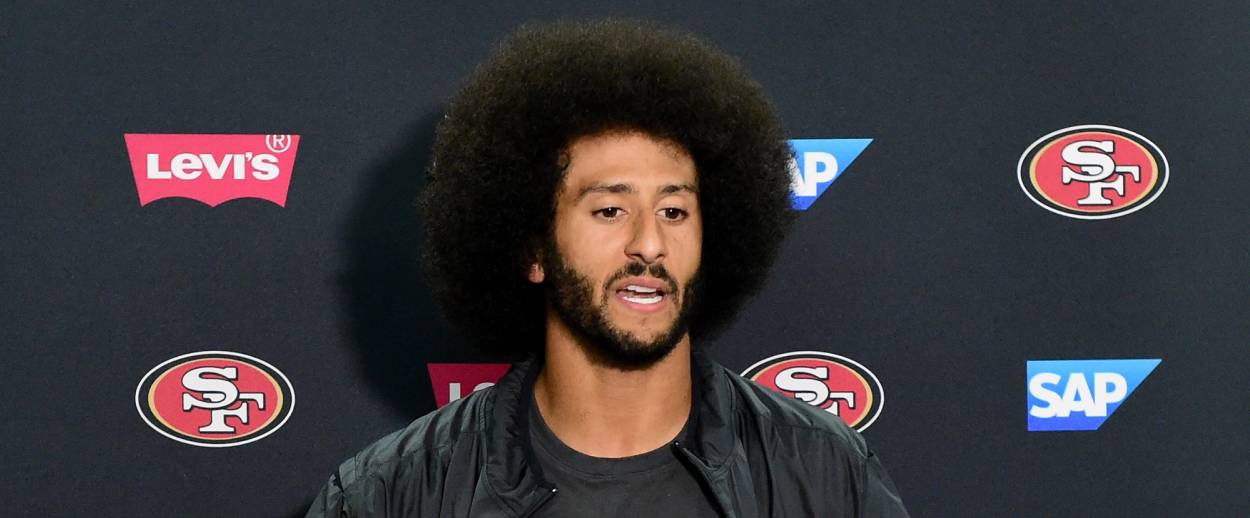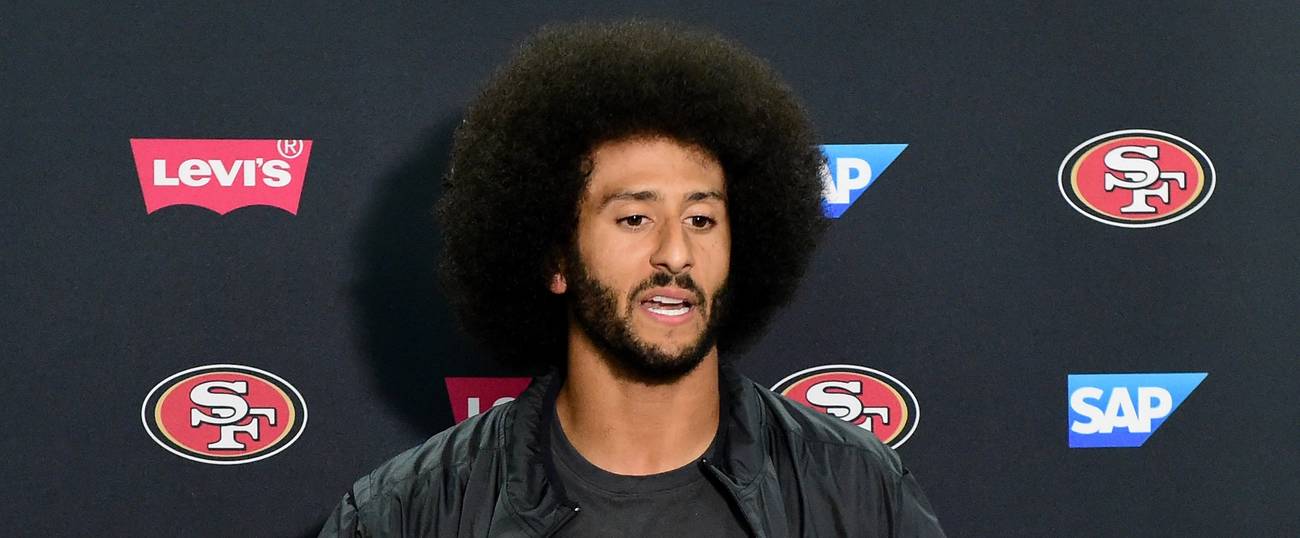I’m With Kaepernick
Growing up, I was taught not to pledge allegiance to America, a country built on a promise of racial equality that’s crumbled in front of our eyes




Some “real Americans” have been in a patriotic tizzy over Colin Kaepernick’s recent protest of “The Star-Spangled Banner,” during which the NFL quarterback sat, and then took a knee (in deference to the sacrifices of veterans), in order to demonstrate his discontent over the treatment of African Americans in general, and disproportionate police brutality in particular. Kaepernick’s continuous protest has inspired others, whether they share the field with him or not, to do the same as the 49ers QB.
(Just to show some numbers, black males make up 6 percent of the American population, but an astounding 40 percent of unarmed victims killed by police. A very odd statistic given that 71 percent of police deaths this year alone, were committed by white males).
Kaepernick’s actions have brought to the surface many unsettling truths about our country, from our national anthem actually being hella racist, to the hypocrisy of Americans, many of them white, who decry the demonstrative tactics of Black Lives Matter in favor of quiet, more peaceful protests—yet also decry said quiet peaceful shows of protest (see: Kaepernick) without delving, with equal intensity, into the reasoning behind such actions. The ironic icing on a this very sad cake is the Santa Clara Police Union’s recent threat not to provide security for future 49ers games, which only underscores Kaepernick’s point.
Kaepernick’s decision has reminded me of my own relationship to this country, as both an African American and a Jew. It reminds me in particular of my first days in public school. As the firstborn son of two New York school teachers, I was home schooled until I was seven years old. See, yeshiva wasn’t (and sometimes still isn’t) a terribly welcoming place, racially speaking, in the ’80s, nor was the public education system particularly stellar. As a result, I wasn’t unleashed upon the formal educational houses of the world until I had more than a fair grasp of both secular knowledge and Jewish identity.
Funny thing my parents neglected to inform me about on my first day of school, and every day thereafter: Hearing “The Star-Spangled Banner,” blared over the loudspeakers, during which you were expected to stand and sing, with hand over heart. Of course, my parents—who came of age during the Civil Rights Movement and the Vietnam War—weren’t particularly nationalistic, so the oversight is thoroughly understandable in retrospect.
As for me, I never even realized the United States had a national anthem. So when my third-grade class stood up for the “Star-Spangled Banner,” I really had no frame of reference. So I just did what the other kids were doing.
And then came parent-teacher night. It was then that my parents discovered that my behavior in school was brash and bold, the opposite of how I acted inside the house. But they also learned that I was a model student when it came to my conduct during the national anthem. There I stood, hand on my heart, despite the fact that it was all new to me. I fell in line.
When we got home that night, in addition to my parents excoriating me for my many many juvenile indiscretions (tickling girls in the back of the classroom, telling jokes, passing gas during class), my mother asked me, “Do you say the Pledge of Allegiance with your class?”
“Yes,” I said.
“With you hand over my heart?”
“Yes.”
“Well, you’re not doing that again,” she demanded. “You can respectfully stand, but you will not put your hand over your heart or say the words of the Pledge. We are Jews. The only entity we pledge allegiance to is Hashem.”
Then my father spoke: “And what has this country done for us as black people that we should pledge allegiance to it?”
And, being a good ‘ol Orthoboy and regular watcher of PBS’ Eyes On The Prize, a documentary series about Civil Right in the U.S., it all began to make sense, even seem obvious, to me once they said it. As my seven year-old self, if I was going to start pledging allegiance to things, then, religiously, there was probably a long list of others things that should likely be honored, with God taking the top spot.
And now? And as an adult with a family who lives and is affected by the same world that Kaepernick is protesting? I feel the same way. It’s America’s current actions that leave me apathetic towards the flag. For Black people anywhere, during, well, anytime, we weren’t in mind when the Founding Fathers crafted a Constitution touting all men being created equal, yet on that Fourth of July we weren’t anywhere near free. (Even as Jews, spinning a dreidel on Hanukkah is not exaclty what they meant by religious freedom, and the lesson of that holiday).
I really can’t bring myself to feel anything but support for Kaepernick. Because, personal resonance aside, if nothing else, exercising the right to sit down as the national anthem plays is one of the most American things one can do. And as for pledging allegiance, personally? America isn’t my God.
MaNishtana is the pseudonym of Shais Rishon, an Orthodox African-American Jewish writer, speaker, rabbi, and author of Thoughts From A Unicorn. His latest book is Ariel Samson, Freelance Rabbi.